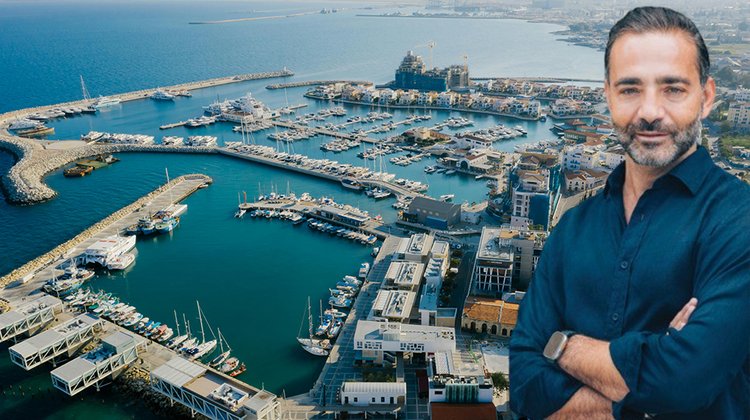Yiannis Misirlis: "There is a pressing need to tackle the severe contraction in available housing and office space in Limassol"
07:17 - 09 July 2024

Yiannis Misirlis, President of the Cyprus Property Developers Association, recently talked about Limassol’s thriving real estate market, highlighting the pressing need to tackle the severe lack of housing options and office space and the importance of green initiatives.
Among other things, he also shared his view on what makes Limassol an attractive real estate investment destination, how foreign investors and investments in luxury properties influenced the city's housing market, and what long-term strategies should be considered to ensure sustainable housing development in Limassol.
Limassol is often viewed as the leader in the local real estate market. What makes the city an attractive real estate investment destination?
Limassol’s reputation as the premier destination in the local real estate market rests on several key factors. Firstly, its strategic location as Cyprus’ financial centre offers unparalleled connectivity to both domestic and international markets, fostering a conducive environment for businesses and investors alike. Additionally, Limassol boasts modern infrastructure, a distinctive skyline and prime real estate, including an impressive marina and port, facilitating seamless trade and commerce. Moreover, the city’s diverse cultural scene, safe beaches and high quality of life make it an attractive destination for both residents and tourists. Furthermore, proactive government policies and incentives, such as Headquartering and Digital Nomad Visas, further enhance Limassol’s allure as a lucrative investment opportunity.
How have foreign investors and investments in luxury properties influenced the housing market in Limassol?
Investment in super-prime real estate was a global trend during the last decade, leading up to the COVID-19 years, and Limassol was no exception. This trend fuelled the development of upscale neighbourhoods and luxury real estate projects. However, the Limassol real estate market was never solely dependent on the super-prime sector, as the numbers following the COVID-19 years demonstrate. Today, the Limassol market is a well-rounded market that remains strong and dynamic, despite global challenges such as high interest rates, inflation and geopolitical issues.
Despite the many advantages accruing from the mass relocation of international companies and their staff to the city, there has been a severe contraction in the availability of housing options and office space. How can this problem be tacked effectively?
The first signs of a housing shortage appeared 5-6 years ago and, personally, I’ve been warning about this since 2019. Mass corporate relocations to Limassol have transformed the city into something special. That said, today there is a pressing need to tackle the severe contraction in available housing and office space. Effective solutions require collaboration between the Government and private sector stakeholders to streamline approval processes for new developments and expedite construction projects. We need to cut red tape and provide incentives to encourage developers to prioritise the construction of affordable housing units and commercial spaces en masse. Furthermore, urban planning initiatives should focus on optimising land use and revitalising underutilised areas to increase the supply of available properties.
What long-term strategies should be considered to ensure sustainable housing development in Limassol?
Sustainable housing development necessitates a comprehensive approach. Firstly, adopting green building practices and integrating renewable energy sources can minimise environmental impact and promote energy efficiency. Secondly, prioritising mixed-use developments that blend residential, commercial and recreational spaces can foster vibrant, walkable communities, reduce traffic and maximise land utilisation. Additionally, preserving cultural heritage sites and promoting urban regeneration initiatives can enhance Limassol’s aesthetic appeal and cultural identity. Collaborative efforts between the public and private sectors are vital for investment in affordable housing initiatives and social infrastructure, ensuring inclusivity and addressing the needs of diverse population segments.
How has the recent conflict in the Middle East affected the real estate sector in Cyprus? Has it deterred foreign investment or created insecurity among professionals in the sector?
The recent conflict in the Middle East has had varying effects on the real estate sector in Cyprus. While geopolitical tensions may have initially sparked uncertainty among investors, Cyprus’ geopolitical stability and reputation as a safe haven have largely mitigated any adverse impacts. Moreover, Cyprus’ proximity to the conflict-affected region has positioned it as an attractive alternative for investors seeking stability and security. However, fluctuations in global markets and investor sentiment may still influence foreign investment flows in the short term. Nonetheless, Cyprus’ resilient economy continues to attract foreign investors looking for long-term growth opportunities in the real estate sector.
What are your predictions for the future of the housing market in Limassol over the next five to ten years?
The housing market in Limassol is poised for continued growth and resilience in the next few years. Urbanisation, population growth and sustained demand from both local and international buyers will drive expansion in the real estate sector. Limassol’s reputation as a cosmopolitan hub for business, leisure and culture will remain attractive to investors seeking premium properties and lifestyle opportunities. Ongoing infrastructure projects and urban development initiatives will enhance the city’s appeal and support sustainable growth. However, vigilance and adaptability to evolving market dynamics, including changes in consumer preferences, regulatory frameworks and global economic conditions, will be crucial to ensuring the long-term viability and prosperity of Limassol’s housing market.
(This interview first appeared in the June edition of GOLD magazine. Click here to view it.)
